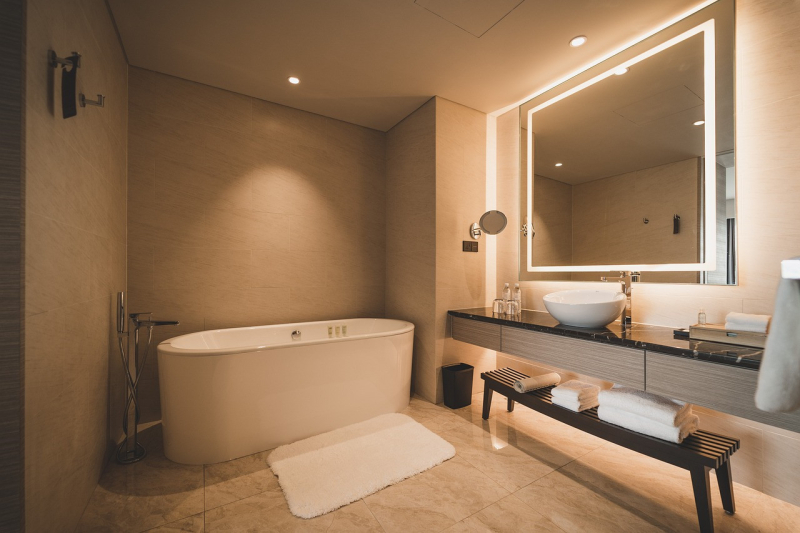Concrete floors in basements can complicate new installations, making precise planning and professional execution essential to avoid future issues. Moisture-resistant materials, such as waterproof membranes, are critical to protecting surfaces and ensuring long-term durability. Proper waterproofing significantly impacts the success and longevity of the project.
Modern bathroom design using large-format ceramic tiles
Modern bathroom renovations emphasize minimalism and the use of large-format tiles to visually expand the space. Tiles that mimic natural materials such as wood, stone, or concrete are widely favored for their timeless appeal. By reducing grout lines, these renovations create a seamless and sleek look, with XXL formats, such as 24x48 inches, being particularly valued for their practicality and aesthetic charm.
Incorporating proper lighting is another hallmark of modern bathroom renovations. LED lighting, including strips in wall niches and beneath cabinetry, not only enhances the appearance of large-format tiles but also adds functionality and elegance to the space
Basement bathrooms with mechanical ventilation
Ventilation is a critical aspect of basement bathroom renovations. Without proper air circulation, issues like moisture and mold can arise. Installing exhaust fans with humidity control features effectively removes excess moisture and improves air quality.
Choosing the right fixtures for basement bathrooms
Selecting the right fixtures is essential for optimizing space and ensuring functionality in a basement bathroom. Due to the typically limited space and structural constraints in basements, compact and space-saving solutions are often the best choice. Wall-mounted sinks, toilets, and vanities are excellent options that free up floor space and contribute to a cleaner, more modern look.
For showers, walk-in designs with linear drains are increasingly popular in basement bathrooms. These options allow for a seamless transition between the shower area and the rest of the bathroom floor, which is particularly useful in small spaces. If a bathtub is desired, corner or asymmetrical models can save space while still offering comfort and utility.
In spaces without windows, mechanical ventilation systems with heat recovery can be a practical solution. These systems ensure efficient air exchange while minimizing energy loss. Combining ventilation with underfloor heating creates a comfortable and energy-efficient bathroom environment suitable for year-round use.

